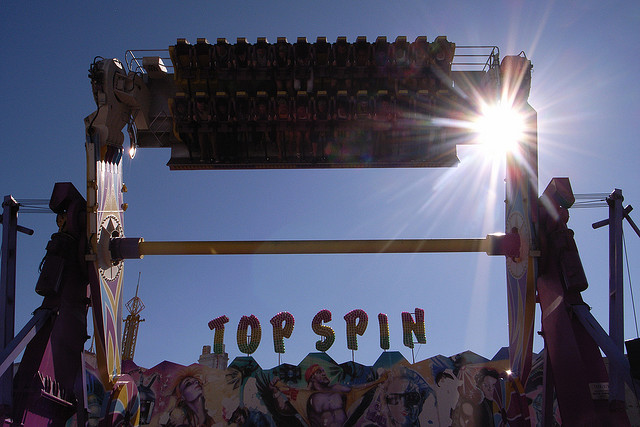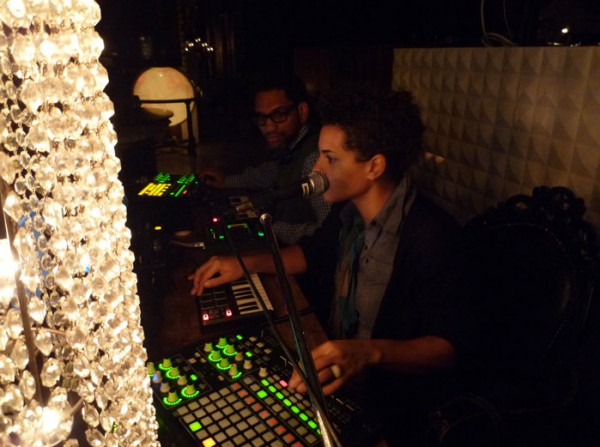
Like the aspiring artists themselves, there’s an abundance of Web services with big dreams of stardom. Most will fall into obscurity, and wading through them is a big chore. And then, love them or hate them, there are the huge pop hits, raking in cash and making kids swoon.
So, here’s a bet. Topspin, already one of a handful of genuinely-promising services for artists and managers to make the music business work, is about to get bigger. Think the Beatles right after they land in the US.
You’ve probably already used Topspin from the other side: know those ubiquitous boxes that ask for your email and return the favor with a free track? That’s the one. (I’ve included a couple from our friends at Saturn Never Sleeps, and Tricil, who tipped us off on this story, to jog your memory.)
Collecting emails is vital. Over the past few years, Web and music conferences have been packed with sessions describing a future where independent artists don’t languish in obscurity, because they collect a handful of “true” fans. Without being able to stay in touch with those fans, none of those visions is possible.
Topspin is a lot more than that, though. It’s an easily-embedded shopping cart for music and merchandise that works on any site or Facebook page. It does international currencies. It’s that email tracking, but it also manages connections on Facebook and Twitter, and helps you follow up on those emails without violating privacy. (Hint: abusing emails isn’t something anyone wants to do. On the contrary, you want to be as well-behaved with email as possible to keep from getting blacklisted.) It has extensive analytics, so you can figure out who your fans are and where they are.
To me, these services are really essential to music in culture. The actual income for most artists won’t be enormous, though every little bit helps. (For instance, imagine artists earning just enough to pay for their health insurance here in the US. That can transform your life and career.) But income aside, the connection between artists and listeners is necessary to getting music heard, and knowing where to play live gigs. That means having smarter artists impacts the rest of us – it means that someone we’ve discovered and loved might actually come to our town and play, for instance, or is motivated to release an extra EP.
And that’s where the news portion of this story enters: Topspin, previous accessible to the few, is coming to the many. In March, just in time for the epic South by Southwest Music Festival, Topspin is rolling out their platform to absolutely everyone, with pricing starting at a lean US$9.99 a month.
With anyone able to climb onboard, and evidently wildly-affordable service prices, Topspin could become the service everyone uses. The company is also promising new platform features and a redesigned app. 4,000-plus artists use Topspin now since it opened in 2008 as a private beta, including the likes of Nine Inch Nails and Arcade Fire. I’m guessing that number could rise from four thousand to “just about everybody.”
That’s all Topspin is saying as of yesterday, but more details are coming; we’ll be watching. I hope you’ll watch here on CDM, of course, but naturally you can use a Topspin widget to get in on the announcement, like so:
There’s also a US$5000 grant program for exploring direct-to-fan business plans, with celebrity judges from Columbia Records, William Morris, the Pixies, Billboard, Berklee, and the like. Details on both:
New Features + Open Access for All Artists+ $5000 D2F Grant
Speaking of how to make this all work, there’s an excellent presentation from LA’s New Music Seminar that explains how you’d put this together as an artist. It’s relevant really whether or not you want to use Topspin. (The contest above also is open to non-Topspin users.)
So, in the spirit of this, here are two sets of artists I really like who demonstrate just how useful Topspin can be in practice. First up, Atlanta-based musician (and long-time CDM community member) Johnny Blaze, aka Tricil, who tipped me off to this story this week via Twitter.
Tricil’s a perfect example of the kind of artists who can thrive in the Web age, a solo “melodic IDM”-centric musician and keyboardist, Live programmer, releasing a music video via iPad, and so on. Tricil tells us that this tool, particularly the mailing list signup, has been invaluable.

On the band-cum-label side, there are our friends at Philadelphia-based Saturn Never Sleeps, including King Britt and Rucyl. They likewise rely on mailing lists to promote unusual, often experimental music from lesser-known artists, along with their far-out musical parties.
There you go — see how easy that was? You got to immediately hear some music, and see if it’s for you without sacrificing cash or worrying about filling out a payment form. They got an email address to keep in touch with you, but can repay you in the form of more free music or, depending on where you live, actually playing for you live and meeting you in person.
And whatever other analyses there may be, if any of this helps keep live music alive, it’s a good thing.
Tried Topspin? Let us know what you think – including criticisms of what you don’t like about the platform, along with what you do.